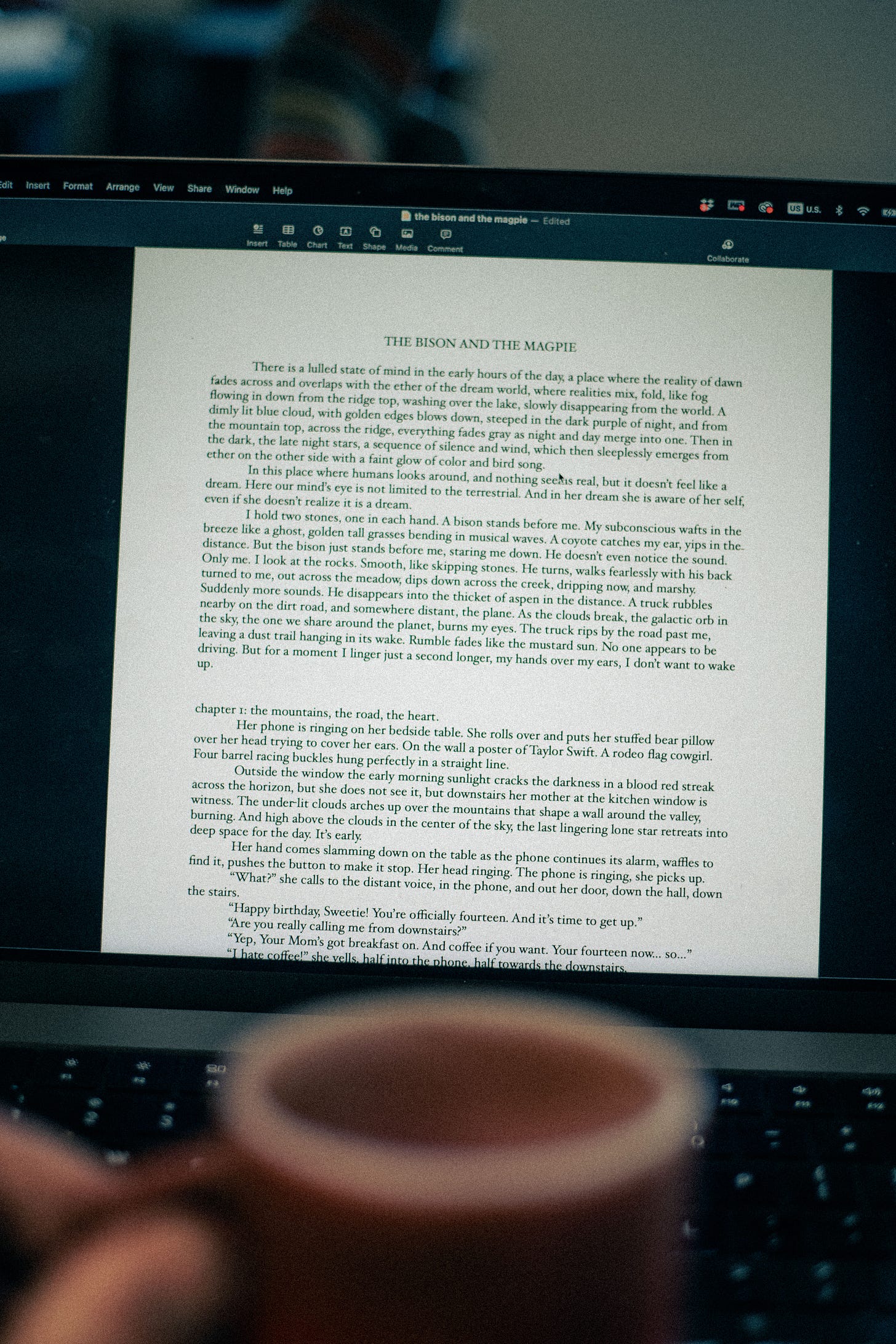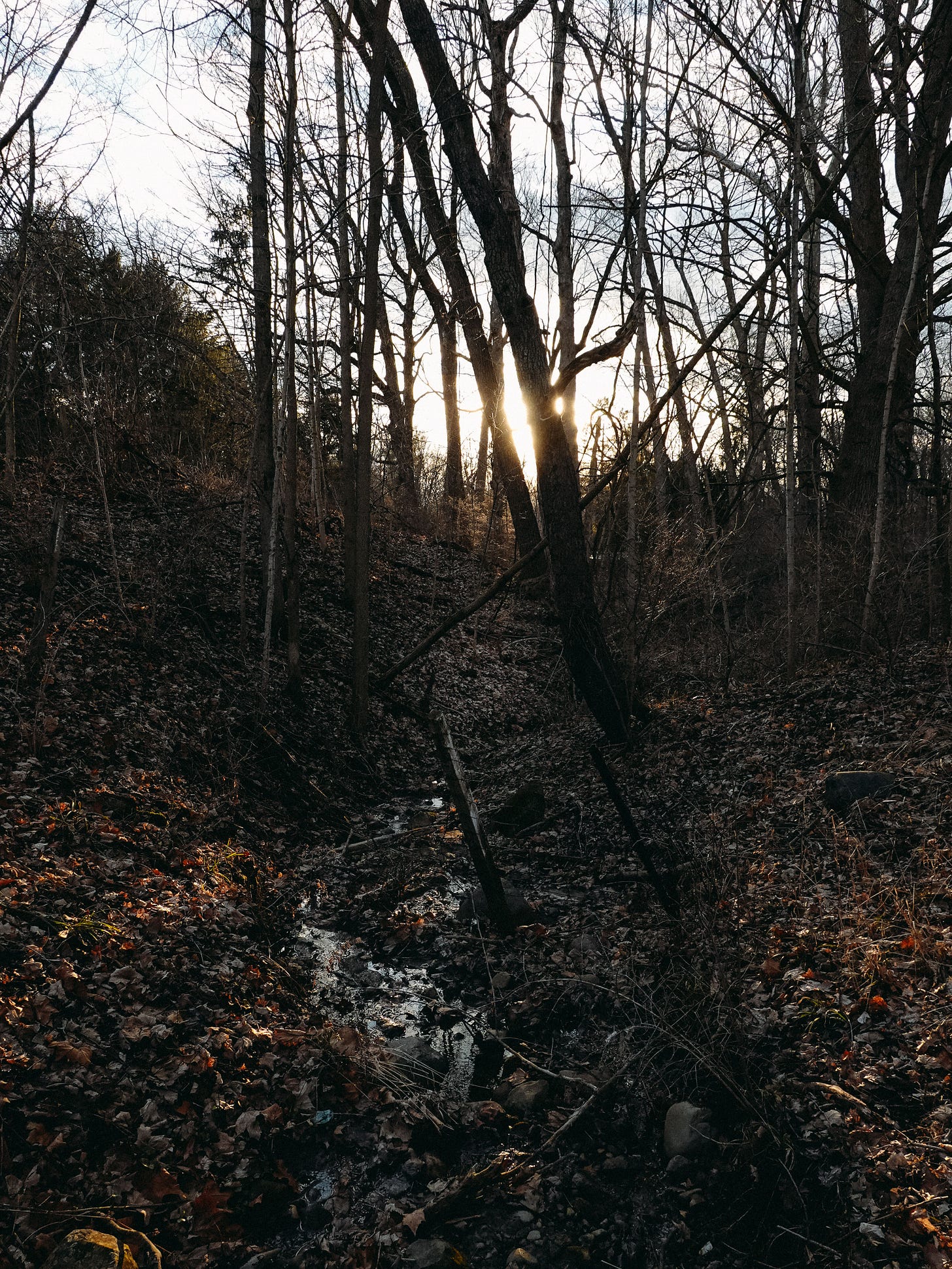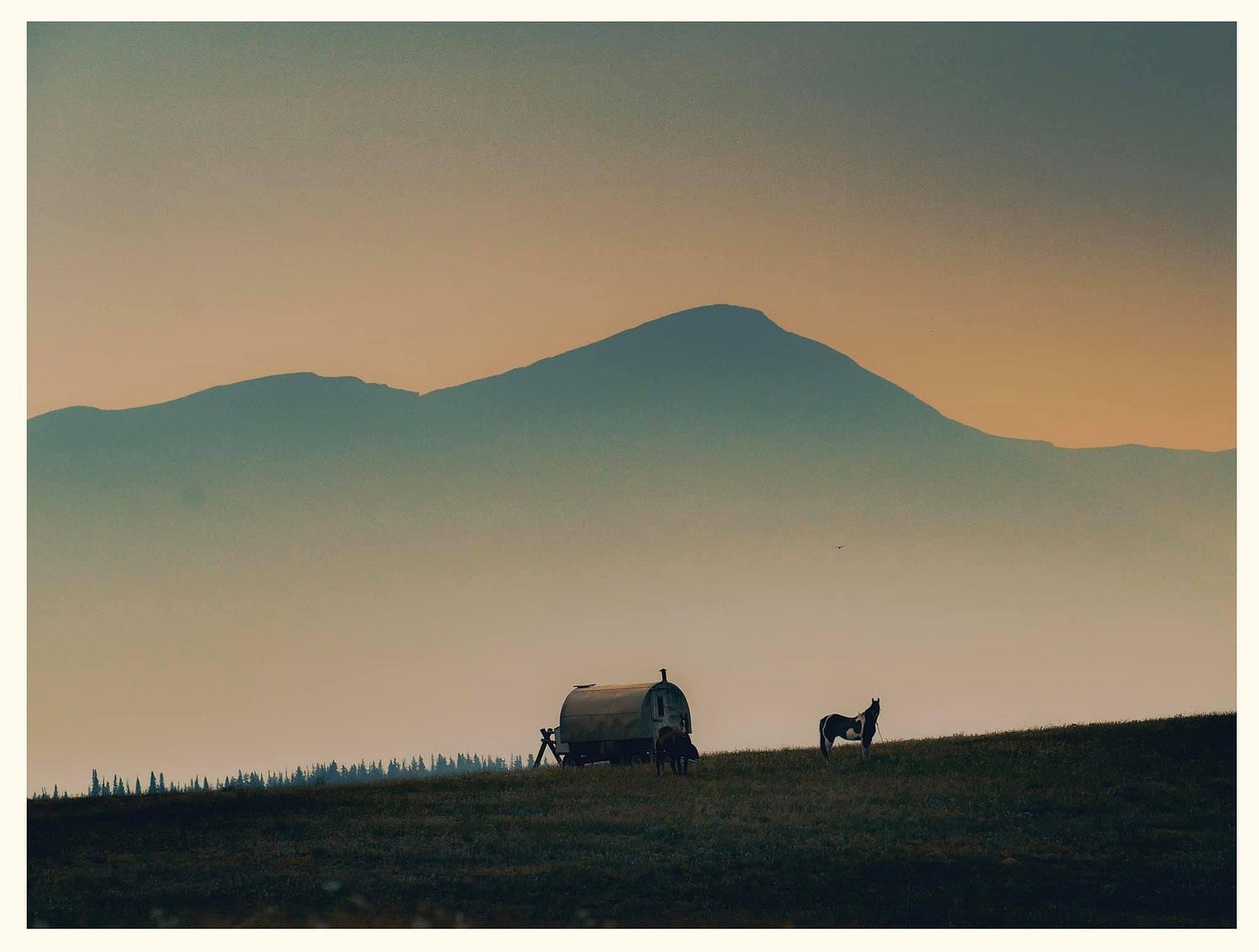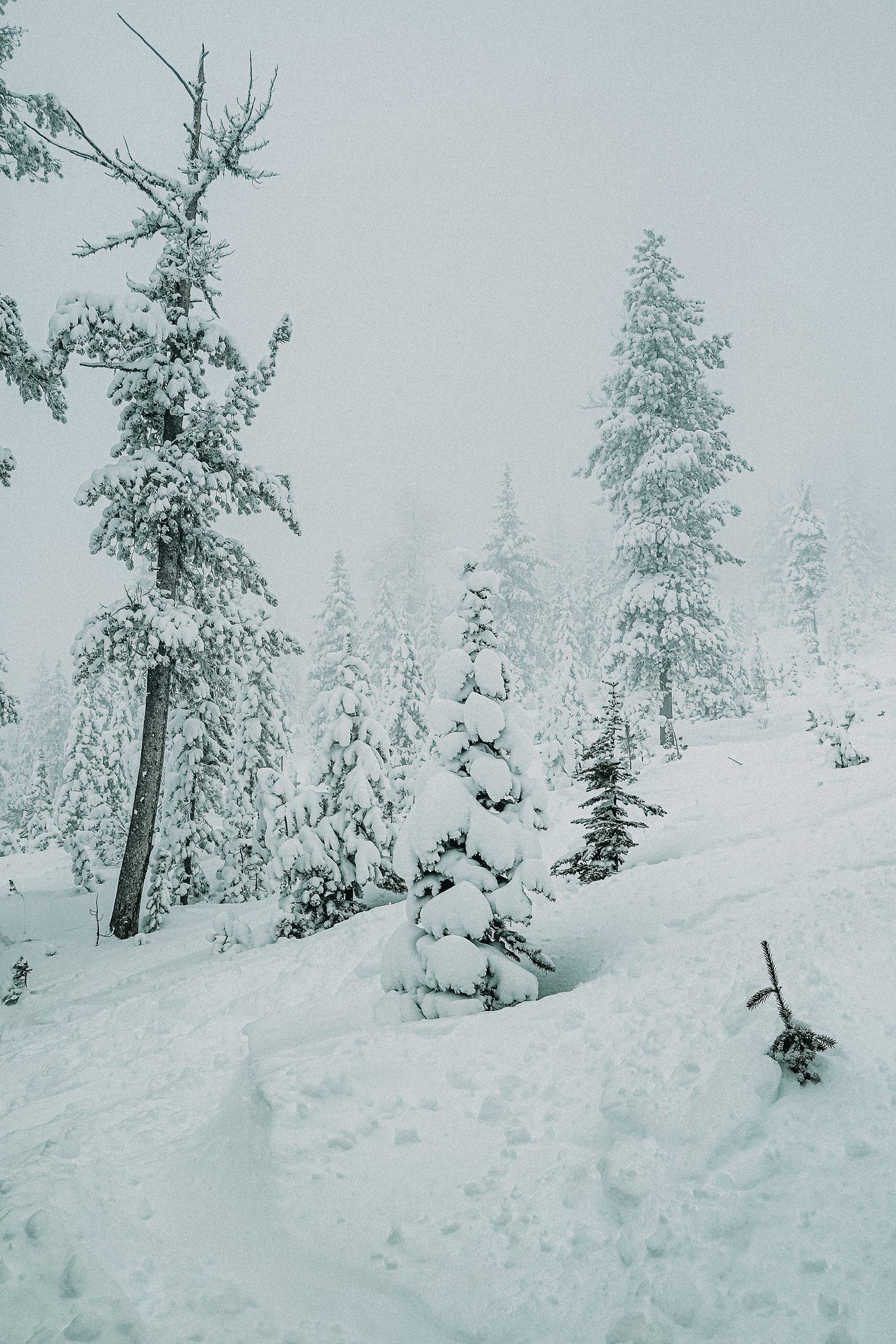A Quiet Place to Think, Ideally Somewhere in the West...
Notes from a quiet corner of a western town in February.
This week I finished a book, and since it is not something I do very often, I thought I’d make some notes on it, first for myself, but possibly to share as well... Here we go:
Ok, first by finished I mean the first draft, and a bit of a rough draft at that, but it’s done (hell yeah!) If there is anything I learned from writing my last book, it is that I’m only getting started with this story now that the first draft is finished. But very possibly the hardest part (besides finding a publisher) is complete, which is carrying a story from a late night spark of an idea to getting it built through tens of thousands of words to a final resolution that feels satisfying.
This book wasn’t ever meant to be long. And the goal was to write it in 6 months. It was a reasonable goal, and I was on track for some time to finish it, but in a very conscious way I decided to put it on hold. This has been my relationship with writing by choice since having kids. Writing does not get the first priority. And this last year with my daughter was finishing high school my priorities were to go to her whenever needed or given the chance. Fun was to be had whenever possible. They say that after your child turns 18 you only have about 1 year total time with them the rest of your life. I take this to heart and tend to hang on to any chance I get. But I digress…
This is the struggle of any writer with children. Time management. But perhaps more importantly, priority management. And as with all I write, this is a self examination, in no way judging or making excuse. Time is prioritized by everyone differently. For me, I thought long and hard about this for myself. When we had kids I knew it was going to slow my writing. And it did. At least for a while. But it also changed it. And within a few years having kids made me more efficient as a writer. Not because I was seeking efficiency, but because time was suddenly a hot commodity. Even as I have a little more free time in these later years of parenting, I know the value of time and learned to hold that perspective.
Kids steal time. In a good way, sure... A fun way. Most of the time. I’ve always been someone who has always had a rather significant love of filling brain space with words, not just my own, but others, in book form, tv form, movies, radio, and then in silence, trying to decipher the sounds of the birds, the dogs, the squirrels, even the huffing of deer. I love the languages even if I don’t understand them. I love to hear them go through my head. I love watching letters appear in formation across a page, my mind reading into them, imagining them and what might come next. Fascinated by where they come from. How does this consciousness happen? It’s wild. I like the structure and rules of language, even when I break them.
When our daughter was born we named her Gretel. I knew I’d write something for her. I knew it would be better than what I’d done before because being for her; I’d put everything into it. So even if it’s judged by others as bad or lacking, I can sit satisfied knowing I put it all into it, the best I had at the time. And time was not something I had back in the aughts.
The first version of the screenplay was a classic telling of Hansel & Gretel. Gretel was to be the heroine in this childhood classic. Woodsy. Old world. Witch laughing, kids getting abandoned and finding their way to the wicked cabin. Witch gets pushed into oven by our hero. Pearl treasure found at the end.
It’s actually a very dark story. Addressing these few subtle points alone made me examine some of the finer details. Abandonment. That alone isn’t an easy to thing to conjure how or why a father would do such a thing. The mother couldn’t be a mother. No mother I’ve met would put feeding herself before her children. So it had to be a stepmother. An old love. Jealous that the crush of her youth went on and fell in love with another woman. And how did this jealous lover deal with it? When she found her way back into his life, she poisoned him to numb his brain, and then killed his wife. She then introduced the idea of abandonment to him, to which he intoxicatedly lead the way.
Then there is the premise of the forest. Why is it so hard to get by all of a sudden when everything presumably had been stable before? Why the hunger? A virus. It has killed many and the forest is hunted to barren.
And for me, the stepmother, after the children have been sent off becomes the witch. It’s a dual identity, but the same person. She holds a secret cabin deeper in the woods to mask her darkest secrets from everyone, including her new husband.
The witch lures the children in, fattens them, and eat them up. Hunger in the this trying age is not something she knows.
It’s a wicked story for sure. But Gretel saves the day. She kills the witch by throwing her in the oven, saves her brother, and finds her dad.
A very fun story to take to length.
I wrote the first version as feature film length in under a month. It came fast, and I wrote it after work a few days per week in short but efficient one hour or less windows. Sometimes I only had 20 minutes. But I had the story and it went fast.
While finishing this first version I had another idea. What if I wrote it as a modern tale? It would take place in Olney, Montana, in present day. The virus still worked. It shut down roads. I’d played with this sort of thing in my mind after living near the the Rocky Mountain Laboratory in the Bitterroot, one of the nations only BSL-4 labs where all sorts of dangerous things get played with. Some speculate this lab was partly involved in an accidental release of the now commonly known pathogen we call Lymes Disease. The lab sits in a valley that would require only three roads be blocked to cut off complete access. This was bubbling in my mind for this more modern tale. People in the valley would rely on deer and elk. But they ran out. People were getting mysteriously sick. They began to hoard. To hide out. First pets went missing. Then people… started eating people. A perfect background for a modern telling of Hansel & Gretel.
Gretel’s family had the advantage that her parents lived off grid in Olney. They stored food. They hunted and foraged. They were already accustomed so when the roads were cut off, they were prepared. But not for the wicked to come.
Gretel’s dad’s ex-girlfriend came back. She’d been in an institution for psychotic behavior, which is alluded to be associated to abuse.
She immediately gets creepy. She eventually kills Gretel and Hansel’s mom. Then comes abandonment. A winter alone surviving in the deep woods of Montana is anything but easy. But again, in the spring, after a long and lot of work, Gretel saves the day.
It’s a fairy tale. The story is the same every time. It could be told a hundred different ways. It was such a satisfying story to play with. The second version of the screenplay took about a year to write. We had our second child by now. Time took another hit.
And I had a third idea. This one a little more abstract, but even more satisfying a challenge. This was a hybridization of the two versions. The forests in Olney are particularly real to me. Vivid. Thick. Green and lush. They have incredible personality. This story takes place in my mind on some of my close friends property. The creek, the meadows, the logging roads beyond and that spider out from their land, are all real places I’ve walked. The forest up in that part of Montana have a certain magic. A dark allure. It’s frightening and exciting all at once. There is a mystery in the woods, an unexplainable feeling of a presence of something not altogether within our capacity of engaging with, as if we don’t have the receptors to clearly witness everything that is going on... an unexplainable presence you sense, but not with your sight, smell, touch, or sound. And I wanted to figure out a way to bring that to life by creating points in the forest that mesh the present with the old. Tom Brown stuff. White Lodge stuff.
I haven’t read Tom Brown in years, but I have a story in my head that I think belongs to him. I’m not actually sure I even read it in a Tom Brown book, but I think it was told to me by one of my brothers. In my likely incorrect memory it is the story of a two modern men tracking in the woods. I picture the woods like Indiana, because that is where I was told the story. Winter. A leafless canopy of oaks, iron wood, walnut trees, and maples. Very few evergreens in sight. The winter ground of frozen leaves crunch under our feet. Everything is a shade of light brown and gray. The sky. The tree trunks. The ground. They are tracking and pause when the teacher, an older Indian tracker, pauses, looks around.
There suddenly is a line of people walking past them. Ancient people. Native Americans. They are walking and none of them seem to see the two men. They are like a dream. A woman overburdened with what she carries and the children pulling at her drops a clay pot and it breaks, but she has to continue on, walking in the line of people. They are moving. At the end, an old man brings up the back of the line. He pauses. He looks directly into the eyes of the tracker, and nods in acknowledgment. Then he continues and they all disappear. The trail is gone. It is just the two men again.
The tracker goes to where the woman had dropped the clay pot and begins digging. Down under a significant layer of earth they find remnants of the clay pot. The woods are not what they seem. Time is not what we think it is.
This forest has something like that. And I never honestly understood why it needed it, but it had it. It is part of the story. A mystery. Somethings we don’t get to know or fully understand.
By the time I finished the third version, writing was in a slow phase for me. I had this a few other stories I was working on, but life was busy. Two kids under 10. I finished the third story version in 2012/2013. But I had another idea still, related to this original project.
This story was to be a novel. My first attempt at a full length novel bar the incredibly long, weird, thing I wrote back in the lookout days, based on MKULTRA. That was novel length but is… unpresentable. It’s like a strange drug trip into words and text... To anyone. To the few friends I’ve shown, I’m sorry. It never should have left my office. But I digress. I think all us writers have that thing in our past. At least I like to tell myself that.
But this one was different.
I started The Four Cornered Forest in the August of 2015 with the goal of writing it in one year. I like deadlines. I’m a no-minute-like-the-last-minute kind of person. So I set deadlines when it really matters.
The first few weeks were slow but steady. I had the scenes though, and already knew the characters. I knew the landscape. I knew the story, and never felt the need to rush. I could write in 20-30 minute increments a few days every week.
When the weather got colder the kids were in the house more, and my time became more cherished. I set up a space heater in the Vanagon which was parked in the garage. The back of the Vanagon was set up like a train car, with seats facing each other and a table in the middle. It was the perfect office. Total silence. Anything out the window was up to my imagination.
The writing went strong during the school year and then slowed as expected over the holidays. Spring brought more and I was close, close, close but then school let out for the summer and weeks went by without time to work on it. did whatever I could to keep it in mind, making notes every day, or going back and editing small sections in ten minute windows here and there. But with a 10 year old and a 6 year old, there was not much time. But then school resumed. I could pull off a reliable couple hours 3 days, sometimes 4 days per week and I wrapped it up at the end of September in 2016. One year and one month.
That was a very fun book to write.
Where was I going?
That was the last book I wrote. I’ve had other writing projects, a few screenplays including one tv series (I wrote this with my friend that lives in Olney on the property that inspired the Four Cornered Forest. We wrote a tv show based on the Copper Kings in Butte), a few short stories, a hundred sketched ideas, and several journals worth of notes and just general writing, but no complete novels. And I’ve been craving it badly. In the passing years I went through the Four Cornered Forest no less than 6 complete times, reworking scenes, looking for corrections, inconsistencies, additions, deletions. But I never felt I had the time to dive in full strength to a new story. I wanted to, but it is a commitment I wasn’t ready for. Work wasn’t ready for. My family wasn’t ready for. I go all in and even when I’m not working on it, I’m working on it.
My brain gets so infused I feel a bit in a daze, and I’m certain that carries over into my focus on much of the rest of my life. Conversations often lapse because I’m drifting in thoughts. It’s not that I’m unfocused. It’s that I’m hyper-focused. But on one thing in particular. I see things happen in my real life and imagine how to put them into the story, even just a cabinet closing, and what’s inside. The way an old man is crossing the street. That step he has. The wear of the cuff as it drags on the asphalt. That is a thing I’ll use. And other things. Characters that have things going on. The step mother. What is it like for a child to watch a stepmother go mad? Every piece of the book is taken from somewhere and that collection doesn’t just occur when I’m actively writing. It accurs whenever I’m thinking about writing. The words going out through my mind at the pace of my typing. (And I’m a fast typist at this point.) But just because I wasn’t doing it, didn’t mean I wouldn’t like to be.
So last year I set the goal of bringing an idea from around the summer of 2015 to fruition. This would be the Bison and the Magpie.
I took this idea seriously. Unlike so many ideas I have, “such and such would make a great story,” this one I knew from the moment I had conceived it, this would work. This was a story I wanted to see for myself on page. It was the book I wanted to read. Not nearly as dark or psychotic as Hansel & Gretel, and the Four Cornered Forest, this story was a simple tale of a young woman experiencing the mountains alone. Not in a fretful way, but in the vein of My Side of the Mountain. More of a kids book, an adventure, meant for any age, though I think I snuck a few swear words in there, which I’d just assume pull out. It’s not complicated. It’s not suspenseful. It’s another ode to the west, the high mountains, and again to my daughters steady connection to these mountains, and it’s an ode to a dog we as a family met in the high mountains of Montana one summer. It also was a really fun book to write, if not without its own challenges.
This last year saw a similar schedule, minus time in the Vanagon. (I miss it more as a writing space than as a transportation vehicle.)

As soon as the school year ended and summer hit time was challenging and basically saw little to no actual writing. But I did the same thing as before, kept the story alive in my mind on a daily basis. Stories tend to hold space in my mind even when I’d rather they not, like house guests that decide to just stay. I have a few of them lingering from over 20 years ago, living rent free in my brain, showing up daily.
But in this regard my mind can stay with a story even if just a few notes per day are actually produced. The story, unlike the Four Cornered Forest, was not worked out though. So there were still puzzle pieces to figure out. Was this why I was putting it off? Or was it truly out of prioritizing time with kids? A few doubts arose. I considered abandoning the thing to begin the next one, a Christmas story I’ve had working itself in my brain for at least 4 years. I gave myself a week to see what at the story could do, see if it could spark. But every time I worked on it my mind went straight back into the mountains, to Magpie and her herding dogs and sheep. It clearly wasn’t time for the Christmas story. This unresolved project was not ready to just be set aside like so many other writing projects in the past. It was to be finished. And even if not in the goal post of six months, I knew it wasn’t going to take much longer once I actually sat to do the work.
Fall allowed me to once again step back in. Gretel was at college in Colorado, Simon now full time at Hellgate. But the writing was slow, even when I had windows. Was I stalling? Did I not have in me the vision to see the ending? I told myself work was keeping me busy (it was.) I told myself when a little more time opened I would get it done. But it just was going so slowly. And then a hold happened again. The holidays. I knew I was close, but January, I told myself. This wasn’t a procrastination, this was a deadline. My brain was now fully committed. Present in the story at times more than in the house. Certainly when no one was around. I’d finish it in January.
And in January after Gretel went back to school and set down to it every day during the week. At least 30 minutes. Ideally 2 hours. And with this final push, I finished. Monday this week. (Ok, I know its February, but still, deadlines are flexible as long as progress is being made.) It’s not as long as the first book, but still novel length, and may still get a few scenes pushed in or pulled, but the first round is done. I don’t want to think right now about how many times I reworked the Four Cornered Forest before writing the next book. I’m going to do it differently this time. I’ll rework it, but not right now.
My mind isn’t ready to stop yet. I’m writing the Christmas story right now. I started last night with the first several thousand words. I hadn’t intended on starting this week, but I knew I would soon. But writing in my journal last night, at a pens pace, I suddenly found I was writing in a voice of the main character. It was his journal. I went with it and laid out the foundation for the first chapter of the book. It doesn’t even have a name yet. In fact I haven’t even decided fully on the main character’s name. While I know exactly who he is, I haven’t played out what people call him.
The kids are older. Gretel is at school and Simon is at an age where a lot less is wanted or needed of me. Being at home available is often as much parenting as is required 90% of the day. Work needs me in waves, and when time permits I have time to write. I’m sure this will change again with the school season, at least for the next few years, but it’s wild for me to see this window of parenting time constraints slowly closing and these window for writing growing again. And with a backlog of ideas, the timing is perfect.
So here we are. That wasn’t really notes from a western town. But rather notes written in a western town. It’s snowy outside. And cold. A cold I was hoping would still come back after a warmer than usual last month, and it did. I like this town better when it’s cold. It moves just a little slower. It’s quieter. This isn’t a new thing for me, I’ve always preferred quiet to loud, slower to more bustle. I’ve never required a city to be happy, in fact quite the opposite. Cities have never once felt like a place I could live. Even my town of 60K feels too big. I’m meant for rural. My brain loves being on the perimeter edge, or beyond. A quiet place to think, ideally somewhere in the west.
Thanks for reading. Have a great weekend.










